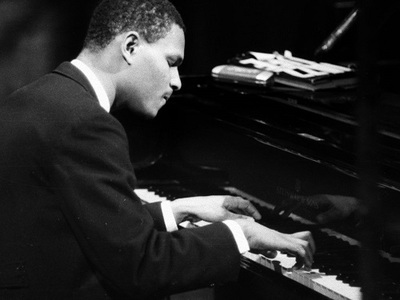A wizard sits us down and invites us to partake of John Coltrane's October 1960 "My Favorite Things," calling attention to McCoy Tyner's piano as an approach to transcendence.
It's been awhile since I heard this, and it has always sparked ambivalence in spite of its beauty. Or because of its beauty. Coltrane's more complex permutations around that time ("Giant Steps," "Spiral") took flak for intellectuality, coldnesss, even ugliness. By covering a Rodgers & Hammerstein ditty from the previous year's hit Broadway show "The Sound of Music," the sax great risked looking like a suck-up, and behold, "My Favorite Things" became his first crossover success.
Coltrane's later and more abstract treatments of the song, including a 1966 version in Japan that lasted an hour and barely referenced the melody, imply that the original was indeed a lollipop offered to get the kids into the dental chair. But there was more to it than that.
Tyner had logged little time with Trane prior to this recording. The leader in fact put the accomplished young pianist in a hard spot: Coltrane had fired previous keysman Steve Kuhn for playing too much, and he wanted fellow Philadelphian Tyner to understate the sophistication he'd earned. Tyner rose (or reduced himself) to the challenge: In "My Favorite Things," we hear him inventing an open harmonic approach that would serve as Coltrane's ideal framework for the next five years.
On the surface, it sounds simple. The Wikipedia entry on the performance describes Tyner as vamping between an E minor and an E major, which is wrong; he's layering a number of chords and, as he shifts, subtracting the notes that could limit Coltrane's improvisations. He sticks to a soft waltz tempo, relying on Elvin Jones' drums for the electrifying rhythmic surprises that kicked Coltrane highest. Steve Davis' selfless bass remains an immovable anchor.
Tyner establishes a trance – repeating, repeating, adding a slight harmonic density, retreating, repeating some more. With great generosity, he's feeling his way into the song, into the communion, into group loyalty. And the listener can't help riding along.
Me, I'm listening for inspiration and missing the point. I even focus on one moment, 5 minutes into the 14-minute journey, where Tyner hits a high note that doesn't fit. A bold harmonic initiation? No, it's just a mistake; Tyner moves on and never looks back, contributing a humble solo after the error but in general providing an essential space where things can happen.
The context of the wizard's lesson: He has recently come from a wizard summit where lurked potential for future differences. "My Favorite Things" stands as an example – a seer expanding his scope, a group working together, a new member patiently seeking common ground. That's the transcendence.

